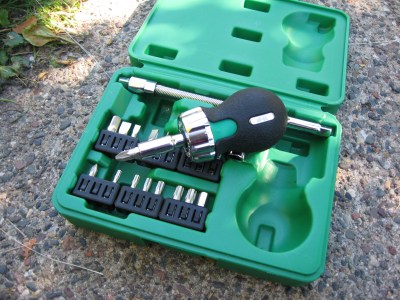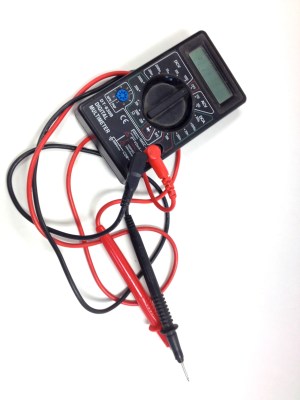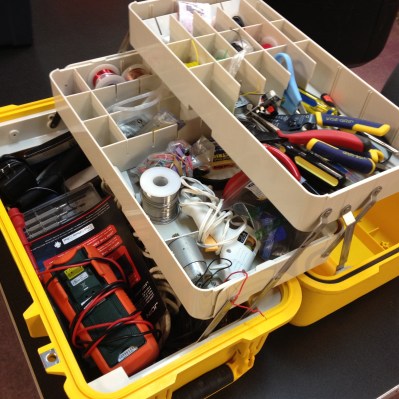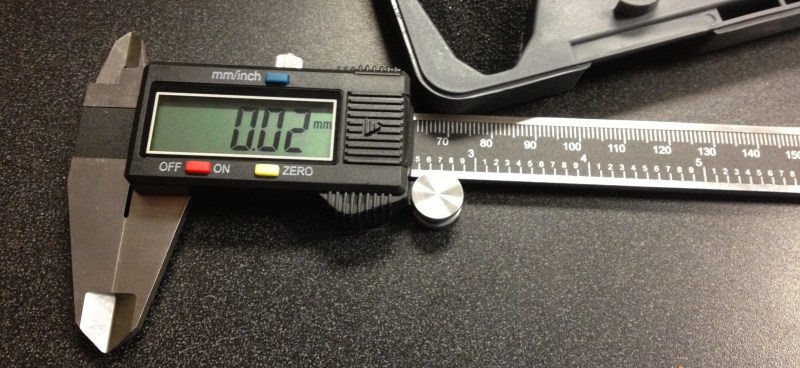Let’s face it, in your workshop there are convenient tools, and there are quality tools, but so often they aren’t both. Think back to the tools you reach for first. Very often for me, speed and convenience win out. I don’t want to look too hard for that drill or saw, and want them to work as expected when I reach for them. At the same time, there are some tools that simply must be stored away, and can’t perch on my workbench forever or sit on a shelf.
It really is a balancing act sometimes. I don’t have a sure fire formula for when to break out the expensive tools, and what jobs are easy with the less expensive. I’ll lay out some of my most-often utilized tools in my arsenal, then I want to hear from you on your own faves.
Convenience Over Quality
 I put a lot of wear on my tools, and they usually stop looking pretty early on, so for me, spending a lot of money on a tool only makes sense if it brings with it greater functionality or durability. For instance, I have a crapass “Workforce” ratcheting screwdriver that does what I want it to. It has a decent ratcheting mechanism — none of the slipping you see in the cheapies. Prehaps even better, the Workforce has room for bits in the handle, giving me 7 to choose from without having to look for my bits.
I put a lot of wear on my tools, and they usually stop looking pretty early on, so for me, spending a lot of money on a tool only makes sense if it brings with it greater functionality or durability. For instance, I have a crapass “Workforce” ratcheting screwdriver that does what I want it to. It has a decent ratcheting mechanism — none of the slipping you see in the cheapies. Prehaps even better, the Workforce has room for bits in the handle, giving me 7 to choose from without having to look for my bits.
I also have a gorgeous SuperKrome ratcheting screwdriver. It is black and green and chrome, and clicks like a Swiss watch when it ratchets. After owning it for around six years, I can tell you it’s been used around 10 times. Mostly it’s so seldom because the SK driver comes in a storage case and the bits are in the case alongside the tool, necessitating that the whole deal be stored in the case all the time. For me, if I have to break a tool out of a case, it’s just one more level of complexity to deal with.
Sometimes you just want to have a “beater” that you can use without worrying about. Some well-meaning relative gave me an expensive level as a gift. I’m talking hardwood with brass fittings and end-caps, weighing around 7 pounds. Its vials look like instruments from some 19th-century schooner. For how much that must have cost, I could have bought every size of cheap plastic level with enough money for a hot dog afterwards. It’s also terrible to store, due to the weight.
The Hot List
With that info in mind, here are the tools that used the most in my projects:
 Cheap Meter: For basic stuff nothing is faster than the DT-830B that has been cloned all to hell. Did I mention it’s cheap? I have a couple of nicer meters, Extechs, but if I’m just testing a couple of things it’s so convenient to use this guy.
Cheap Meter: For basic stuff nothing is faster than the DT-830B that has been cloned all to hell. Did I mention it’s cheap? I have a couple of nicer meters, Extechs, but if I’m just testing a couple of things it’s so convenient to use this guy.
Cordless Drill: I use an 18v cordless drill quite a lot, for driving screws as well as drilling holes. It’s probably my #1 homeowner’s tool as well. If you’re in the market, I would definitely say to buy a quality name brand. In many senses they’re all the same, the top tier of Makita, DeWalt, Milwaukee, and so on. You just have to buy into an ecosystem so all your batteries will work together. I’ve used no-name cordless drills and they’re cheap pieces of junk waiting to fly apart (and be scavenged for drill motor hacks).
Multitool: Any time I forget my multitool I find a reason why I should have had it on me. Everyone has their own favorite; I’ve been using a SOG No. 61 forever and have few complaints.
Cordless Dremel: This is one of the few cased tools I use on a frequent basis. It’s fairly tough, with a sturdy plastic and steel frame that helps absorb a lot of the tool’s vibrations. Cordless means I can use it much more readily than its corded cousins, bring it to play in all sorts of situations. I haven’t found the best way to store bits beyond in the case.
Laser Cutter: My favorite tool; it usually just does what I expect. I use the hackerspace’s laser, and I’m finally fine-tuning my processes to the point where I don’t ruin projects as often as I used to. Limiting myself to just a couple of common materials, I know just what settings to use to output quickly and surely.
Digital Caliper. I have one of those $15 cheapies that works perfectly fine, but is very light and flimsy. I’m on the lookout for one that I can leave out of the case without worrying about it. For the money it’s a fantastic tool — it just weighs next to nothing.
 Hot Glue Gun: Anyone who pays a lot of money for their glue gun better be getting WiFi and padded seats with it, because even a midrange $10 model will give quality work for years. One more expensive version I’d like to try is a cordless electric glue gun (like a DeWalt), but only if I was working on a big project.
Hot Glue Gun: Anyone who pays a lot of money for their glue gun better be getting WiFi and padded seats with it, because even a midrange $10 model will give quality work for years. One more expensive version I’d like to try is a cordless electric glue gun (like a DeWalt), but only if I was working on a big project.
Hex Wrench: I have a set of Eklind hex wrenches that work brilliantly for my needs. I spent literally years fumbling around with other hex drivers, searching around for the right hex size, swapping in vaguely hexlike security bits when I couldn’t find the right one. Once I had an opportunity to try one of these guys, I never looked back. Eklinds are incredibly simple, with one wrench per size, and with imperial and Metric sizes available. They also have really long necks, allowing you to tighten socket-headed bolts in hard-to-reach places. I use these guys for robots and other projects with socket-head bolts.
Automatic Wire Strippers: I really like these classic automatic wire strippers that over the years have been cloned repeatedly and no longer are sold under any recognizable brand name. I have some different sets of wire strippers that are intrinsically better constructed and more precise, but this set is faster and easier to use.
Measuring Tape: The same as with levels, a large number of cheap tapes is better than one amazing one, unless it does something really cool like cleaning your soldering iron’s sponge. The convenience factor alone makes it worth getting 10 cheapies since, let’s be realistic, you’re not getting any added value from the fancy pants tape.
Enough about my tools. Leave a comment! I want to hear from you about your favorites. What works for you and why?
















I had a superintendent who, regardless of the problem, only ever used a hammer! Leaky pipe? Hammer out the wall, then hammer the pipe. Door won’t latch? Hammer the latch. Intercom won’t work? Hammer it until it does!
A fist solves vsync problems on the old tube TVs. By extending that logic … hammer fixes everything!
Sore testicle?
Only if you hit the cyst just right.
In the “stranded on an island”-situation I would opt for:
Knipex Wrench, Knife, a good set of needle files, duct tape, self tapping screws w/matching driver, ball peen hammer, caliper, lighter, headlamp.
You can fix/build almost anything with that.
I never remember how useful files are. I always end up shaving materiel off with a blade instead…
G. K. Chesterton, the famous British writer, was once invited to a meeting of the leading intellectuals in England. They were asked if they were shipwrecked on an island, what would be the one book they would want to have with them. Everyone expected Chesterton, a prominent Christian, to say “the Bible.” When it came his turn to speak, however, Chesterton said that if he were shipwrecked on a desert island, he’d like to have “Thomas’s Guide to Practical Shipbuilding.”
By far the best screwdriver I have ever owned: https://spectools.com/shop/professional-overdriver-model-rgo-5412/
– Swiss army knife; used to use a cheap knockoff, but my parent’s treated me to an victorinox. I forget the exact model, but it’s one of the ones with a pair of pliers.
– Stanley 4-in-1 screwdriver; 4 tips that seem to be about right for most screws, and caps on both ends so you can keep it in your pocket without stabbing holes in the lining.
Those both get used a lot as they’re always in my pocket, and hence always within reach. Saves time trying to find the right tool, particularly at uni. Beyond that; cheap soldering station, cheap mulitimeter (looking to upgrade both sometime soon), set of needle-nose pliers, automatic wire stripper, set of needle files, digital caliper, and a set of Allen keys.
1. A hammer.
2. A bigger hammer.
Indeed, I often find a whole bag of hammers indispensable as a reference standard when evaluating the intellect of online commenters,
My old joke was –
In my tool box I only have three different sized hammers and two of them have never been used.
B^)
Lathe, definitly the lathe. Underrated in the time of 3D printer and CNC laser/mill, but it’s the most versatile and mandatory machine tool.
I have 2 lathes, a Raglan 5″ capstan with a collet chuck and a 1942 leblond,I use them rarely and usually choose the leblond because it’s a much quicker set up and has a conventional chuck, a few years ago I nearly sold the Raglan as it hadn’t been used for over 2 years then the repetitive job of converting nearly 200 morse taper drill bits to blacksmith drill bits came in and the Raglan showed it could more than earn it’s space in the work shop.
Razor blade. A pack of 100 is cheap, and a new blade will cut whatever you need to cut. Use once or twice, throw out.
This is honestly one of the worst hackaday articles I have ever read! Who is this aimed at? As a technician who has worked in both the field and the lab I could not imagine relying on beat on tools for repeated tasks, precision tasks or especially when working in the lab not using calibrated tools!
I’ve owned a ton of tools over the years and find that you can buy most of them once if you purchase quality and use them as intended. Don’t get me wrong I fully understand the usefulness of some cheap crap that’s meant to be used as such but for most other tasks I reach for something that works well and feels good i my hand, something reliable that I can count on and won’t cause injury from repetitive use.
Just to clarify I’m not a sucker for the latest and the greatest, more so the tried, true and reliable which is why I own a 1950’s southbend latheworks drill press that has been tested to .0015″ of runout and .0025″ square, within 5/10000 of it’s original spec and is over 65 years old.
I need to comment on my own comment over how crazy this article is, how can you possible suggest that’s it’s good practice to buy the cheapest levels and tape measures, maybe the next thing to recommend are the cheapest possible squares since close enough is good especially when dealing with stacked tolerances which happens in every project unless you work in ideal 2D land.
@[md]
It’s not all about quality precision tools for everything. It’s about tools that are appropriate for the the job at hand.
For example, I don’t use my micrometers to measure the pebbles when mixing cement to make a fish pond and I don’t use a shovel to remove components from a circuit board.
I have several sets of tools. I have a rusty old car tool box. I have oily machine tools in the metal workshop and I wouldn’t take these tools any where near a circuit board. I have separate tool boxes for electronics. One sealed waterproof and dust-proof storage container for specialist tools. On sealed waterproof and dust-proof storage container for tools that I don’t need often. One aluminium toolbox for common use tools and then I have the everyday tools on the bench like – glasses, calipers, cutters, soldering iron and stand and unfortunately also half the tolls that should be in the alumunium toolbox. Messy but manageable.
The article cannot be as bad as you imagine, it has over 150 comments, some people have learned things, including myself, apparently leatherman type tools are not a waste of time and money, others have had their thoughts confirmed.
I do agree with you on some points, some tools bought on the cheap will inevitably cause damage, for example cheap sockets or even sockets with more than 6 sides, because eventually you are going to slip a tube over the breaker bar for that one bolt that wont move.
Squares and the likes of do have to be accurate, cheap plastic Chinese squares have 90 degree corners, what other requirements does a square have? I also have a folding aluminium square, again Chinese and cheap and accurate.
I too have an old drill press 1920s it too can drill accurate holes, despite there being about a 32 of an inch of slop in the chuck, accurate sharpening of drill bits being the key to accurate holes.
Cheap, worthless tape measures are the best thing ever! Lets be honest, they’re not the best way to accurately measure most of the time anyway, so why pay more than £1 or even $1, they snap,crack,the spring breaks, they refuse to recoil and they get lost or stolen, buy 10 then no matter what you’re not going to end up using a 12in steel rule to measure a16 foot board.
Tools get lost and or dropped, everyone I know flips the level end to end while checking, everyone! Why? They all own fancy Louis Vuitton levels to match their dewalt drills, then panic when they can’t find it or drop it or I use it to poke concrete around a post, which funnily enough you can do with a cheap level,they’re washable and if you’re going to flip it end for end an accurate reading is unnecessary, as long as it’s the same both ways!
The bottom line is if it needs to be strong it cannot be cheap, but there is a whole world out there loaded with cheap reliable accurate tools, just look at any of the “DRO conversion for a manual lathe/mill” all centered around cheap digital calipers from China for £16.
Also, you don’t need a square if you’ve got an old house, you’ll find the corners are precisely 89,5 degrees or 90.3 or something. :-D
I used to have a house built in 1847. The “right” angles were even worse than that. Hanging a new front door was a treat, all four corners at a different angle…
Do you think that they built like that because Chinese squares weren’t available back then, whereas now they’re easily available but builders won’t use them because they’re Chinese and don’t cost £100.
Learn from the brits, back in the 70s we had a car industry, then the Japanese cars arrived, rather than facing the competition head on we buried our heads in the sand and refered to them as “japcrap”, then the first winter arrived the Japanese car owners just got in their cars and drove to work, those that chose to hang on to their trusty British steed were left getting battery chargers out and spraying easy start (ether) into their engines hoping to get some life into them, then driving to work with their brown headlights, it was beyond pathetic.
Many John Deere casting are made in China, crawl underneath any 4wd variant and look at the front axle, you’re not going to get rid of the competition by pretending it’s all aload of crap, which a lot of it is, but everyone produces some crap.
The other thing of course being that builders tend to be a bit slack when it comes to measurements, way more so that most carpenters who are more tolerant to a bit here and there than engineers.
Well isn’t a door supposed to have four angles lol perhaps not four *different* angles.
I had a so called tradesman come here one day to replace a front door.
When the new door wouldn’t fit I said to him that you have to cut the door to fit the doorway to which he responded “we don’t do that”.
Being a little short on patience that day, I replied “then cut the ^$%^% doorway to fit the door”. It’s a brick house.
I have used cheap and expensive glue guns. But the one that made a difference is the small portable one that heats in 30 seconds. For somebody gluing mostly small stuff, the fast heat time makes all the difference. I made a teardown / review here http://www.electrobob.com/bosch-glue-pen-teardown/
I’m a hobbyist reloader, analog calipers or a pocket scale are always my go-to.
Here is a thing to keep all the tools handy on your desk:
thing:2551559
If you make the base slightly smaller it’s also an alarm system for people trying to “borrow” your tools, by the slam as it falls and the screams from crushed body parts.
My leatherman. 100%. Watch Macgyver and you can see how much you can do with a multi-tool. He used a swiss army knife, but I think leatherman’s are way better quality. Many of the tools are job centered, they have a bunch of gun tools, an EOD knife, but I think the suertool 300 is a good all around knife. I go for that even before my dikes or wire strippers.
1) magifying loupe, 3x power
2) Pliers, hammers, good steel rule, scriber, engineers square
3) Digital caliper
4) Cheap Dremel clone with good assortment of cutoff wheels, wire mops, grinding wheels
5) Cheap drill press
6) EMCO Unimat 3 lathe. Possibly the most underrated small machine tool ever made.
Wow…lots of good ideas; however, no mention yet of high intensity lamps you can point into the work area. Also, an air compressor has been great value blowing out old vintage equipment and servicing those high pressure RV tires. I still have the Weller Soldering Gun from my youth, so it’s over 50 years old and going strong…new cord is all. Several sizes of vices always handy for holding a piece in work.
All of my precision machinist/mechanics tools all American made were donated to a nice young couple starting a shop. Of coarse, after that I needed a large 1/2 drive socket. I was donated my FIL tools. Got to have tape measure, pencil, workmate, nicad driven power tools (Firestorm) old but work. Cheap analog and a decent fluke type meters. Various hand tools, dremels, etc. Now I tinker with watches and all of that it entrails.